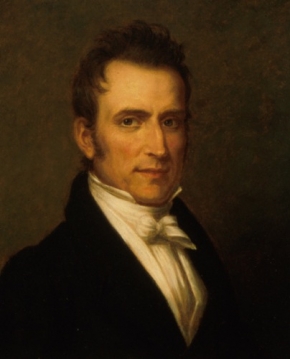You are here
Circuit Court Opinions:
Associate Justice John McLean, Story v. Holcombe (1847)

Story v. Holcombe, 23 F. Cas. 171 (C.C.D. Ohio 1847) (No. 13,497) [Seventh Circuit]
Justice Joseph Story, who served on the Supreme Court from 1811 until 1845 and as a professor at Harvard Law School from 1829 to 1845, was one of the foremost legal scholars of his time. In 1836, he published Commentaries on Equity Jurisprudence, which became the leading work on the subject. After Story’s death, the executors of his estate sued J. P. Holcombe, who published an abridgment of the treatise, for copyright infringement. Justice McLean confessed that the case had caused him “great anxiety and embarrassment” because of the “painful uncertainty” and inconsistency of precedents on copyright law. The case might have been awkward for McLean for another reason: he had served alongside Story on the Supreme Court, as had six other justices then on the Court.
McLean expressed his personal view that an abridgment should be considered an infringement of copyright because it would contain the same principles as the original work and would therefore damage sales of that work. He was unpersuaded by the argument that an abridgment was aimed at “a different class of readers, by its cheapness” and would be purchased only by those who could not afford to purchase the complete work. However, McLean recognized that both English and American precedents treated abridgments as permissible under copyright law. “I yield to [precedent] in this instance,” he wrote, “more as a principle of law, than a rule of reason or justice.”
The justice then turned to the question of whether the defendant’s publication could be considered a true abridgment, and thus a new work, which turned on the question of whether it had required “labor and exercise of judgment” rather than mere copying. McLean ruled that one part of a work could be considered an infringement while another might be classified a genuine abridgment. In the case at hand, he found the first one hundred pages of Holcombe’s book to be an infringement because they had been largely copied, in substance and in form, from Story’s work. The rest of the book, however, he ruled a permissible abridgment because “[t]he matter is greatly condensed by Mr. Holcombe in his own language, and in a manner highly creditable to him.”
McLean noted that he found for the plaintiffs as to the first part of the book with reluctance, “being sensible that the motives of Mr. Holcombe were honorable, and that there was no intention on his part, unjustifiably, to appropriate the labors of Judge Story to his own advantage.” He concluded by expressing the hope that the parties would be able to reach an “amicable adjustment” of the matter, asserting that Justice Story, were he alive, would wish for the same result. Under modern U.S. copyright law, a copyright holder possesses the exclusive right to prepare derivative works such as abridgments.
